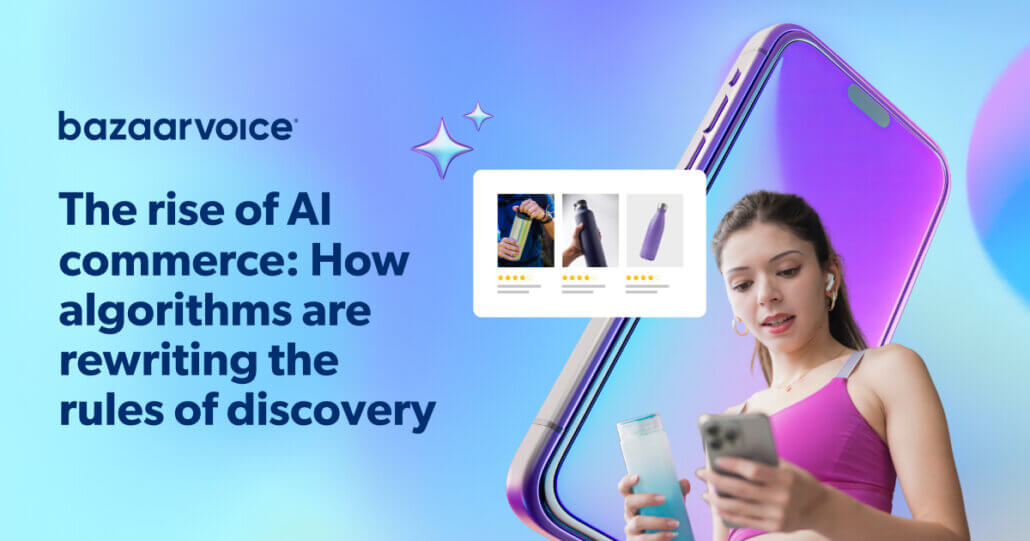May 13, 2025
Just a few years ago, many shoppers looked at private brand products and saw nothing more than cheap knockoffs. But fast-forward to 2025, and something remarkable has happened. Private brands aren’t just surviving, they’re thriving. They’re leading innovation, earning shopper trust, and helping retailers protect their margins in unpredictable economic times.
This transformation — and how to sustain it — was the focus of our recent webinar, Owned Brands Playbook 2025: How Private Labels Win Shopper Trust & Loyalty. Hosted by Mena Wouters, VP of Retail Client Strategy and Insights at Bazaarvoice, the session explored insights from the front lines of retail strategy.
One key theme Mena emphasized during the session was the uphill battle many private brands face: limited budgets, a lack of visibility, and the constant need to earn shopper trust. Without the name recognition of national brands, private brands must work twice as hard to earn shopper confidence.
Throughout the session, Mena unpacked the forces reshaping private brands — from evolving shopper expectations to economic pressures like tariffs — and offered actionable strategies retailers can adopt to strengthen their programs and stand out.
So, what’s changed in private brands, and what’s driving their momentum in 2025?
Let’s dive in.
From budget buys to trusted brands
In Europe, private labels are booming. Retailers like Sainsbury’s and Tesco now generate over 40% of their sales from owned brands. This isn’t just a growth story; it’s a profitability story. European retailers see an average 7% pre-tax profit from private brands, compared to just 2% in the U.S., where private brand penetration is only 15%.
Why the disparity? Strategy and economics.
Tariffs are changing the game
In the U.S., fluctuating tariffs on imported goods have made national brands more expensive. Retailers are left scrambling to protect price points without sacrificing margins. But here’s where private brands take over: they give retailers control.
By owning the product and supply chain, brands can pivot quickly, sourcing more cost-effective ingredients, switching suppliers, and avoiding tariff spikes. That agility protects both profit margins and the shopper’s wallet.
Private brands today are agile, authentic, and exclusive
Today’s shoppers aren’t just buying based on price; they’re buying based on trust. Quality, authenticity, and brand alignment matter more than ever, and private brands are meeting the moment. They’re no longer just filling gaps on the shelf; they’re carving out their own identity. How are the most successful private brands doing this? By:
- Offering exclusive products that can’t be found elsewhere
- Delivering exceptional value without compromising on quality
- Reacting quickly to market trends and shopper feedback
- Aligning with shopper values, whether that means being more sustainable, health-conscious, or innovative
This evolution has helped private brands become trusted favorites in a competitive market. Retailers like Home Depot Canada exemplify this shift. By leveraging user-generated content such as ratings and reviews, Home Depot turned its website into a decision-making tool for shoppers, reinforcing online and in-store trust. Their private brand success didn’t rely on deep discounts but on helping customers feel confident in their choices.
Similarly, Petco used product sampling to fuel its brand growth. Sampling drove a 48% increase in revenue for their store brand products by giving shoppers a hands-on experience, paired with authentic reviews to back it up.
As Hannah Kredich, Category Specialist at Petco, shared:
We’ve really seen a positive impact on visits, conversions, and improving the discoverability of new products. From a results standpoint, it’s been a positive experience to see that we can get 10-15 reviews for new products quickly.
But let’s be honest — it’s not easy!
Challenges faced by private brands
Even with the growing appeal of private brands, the road to success is anything but smooth. Private brand managers are constantly expected to do more with less. Competing with established national brands means facing off against billion-dollar marketing budgets and generations of brand loyalty. Meanwhile, these teams are juggling increasingly complex challenges, like tighter marketing spend, rapidly evolving shopper behavior, and disconnected analytics that make proving ROI a struggle.
One of the biggest roadblocks is visibility. Many private brands struggle to stand out, especially when brand awareness is low. And even if a shopper tries the product once, how do you convince them to come back? That’s where trust becomes the currency. Without strong social proof, like reviews, Q&As, or customer photos, reassuring potential buyers that your private brand delivers the same (or better) value as the national name next to it is challenging. Winning that trust involves transparency, agility, and customer-centric content strategies.
How private brands can leverage UGC to win trust at scale
UGC becomes a powerful equalizer. Shoppers trust fellow shoppers, and authentic reviews, ratings, and photos can do what ads can’t: build credibility quickly.
Private brands that scale UGC effectively are seeing real results. Even with limited awareness, they can foster transparency, showcase product quality, and increase conversion — all without doubling the ad budget.
What do shoppers want in 2025?
The data speaks volumes. According to the Shopper Preference Report, the amount of shoppers seeking private brands is on the rise, especially in food, beverages, and household cleaning categories. But consumers aren’t making these decisions blindly. They want:
- Confidence in quality and consistency
- Proof that others trust the brand
- A connection with the brand’s values
This is why the path to success isn’t just about great products; it’s about great storytelling, social proof, and innovative supply chain strategy.
The takeaway: A private brand is a power move
Private brands are no longer the underdogs. They’re strategic assets, giving retailers control, flexibility, and a chance to create something distinctive. In a world of economic uncertainty, evolving shopper trust, and rising expectations, owning your brand story is more critical than ever.
As retailers refine their private brand strategies, one thing is clear: the winners in 2025 will be the ones who listen to their shoppers, act on feedback, and leverage the trust-building power of UGC.
Looking for additional insights? Our latest Owned brands playbook provides more data, trends, and retail-tested strategies. It’s your roadmap to scaling trust, content, and growth across your private brand portfolio.





